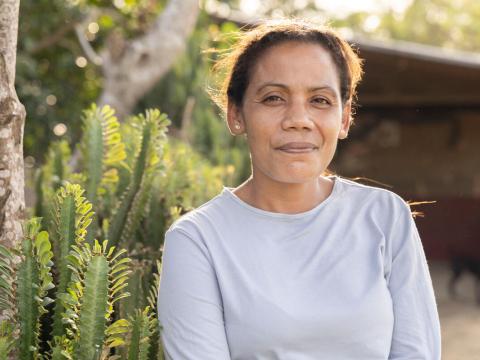A teacher’s promise: Indigenous children's access to education

Teacher Cecilia is one of the very few Aetas (indigenous Filipino people) in her group who graduated from college. Her perseverance to graduate stemmed from her dream to teach the children in her community.
A former Aeta chieftain, Cecilia knows too well why education should be integrated in their culture.
“People belittle you when you are not educated. More so because we are Aeta,” she says.
The Aeta is an indigenous group of people living in various parts of the Philippines’ Luzon island. They are primarily nomadic.

“When I was young, my family and I would often move from one place to another to sell our commodities. We would stay one month in a place, then move to a new place for another month. With this lifestyle, going to school was a challenge for me and for any Aeta child then,” Cecilia explains.
But getting a college degree was drummed into Cecilia’s head from the beginning and she made her way through second year high school - a feat uncommon in her community.
Ten years later, opportunity knocked on her door when the local government officials offered her to take the Alternative Learning System, a form of learning system in the Philippines offered to those who want to complete primary and secondary education. Cecilia took the opportunity.

“Studying again after 10 years was difficult, especially Mathematics,” Cecilia shares, laughing. “When I took an exam to see if I’m fit to enter college, I failed on my first try. I tried again the following year and was fortunate this time.”
Cecilia passed the readiness exam in 2010 and enrolled in a nearby community college where she studied a Bachelor of Elementary Education.
“I was going to school like my children. My daily routine was to prepare our food in the morning then we go to school. In the afternoon, I sold herbal medicine in another town,” Cecilia recalls, adding that her children didn’t mind that she was also a student like them.
But two years into her course, she stopped.

“I was a working student and a mother of young children. I only earned between Php200-Php700 (US$3.90-US$13.60) selling herbal medicine that we used for our daily needs.
“My husband had no regular work. Sometimes, he had work for weeks, and other weeks, none. My daily allowance then was only Php50 (US$1), enough to cover for my transportation. Our financially tight situation forced me to forgo my schooling,” she recalls.
Cecilia stopped for more than six years. In those years, her ambition to be a teacher never ebbed. She eventually received news that she had qualified for a scholarship.
Around this time, World Vision Philippines put one of her school-aged children into our sponsorship programme.
This assistance eases the difficulty of sending their children to school.

“We did not have to spend for school materials, because World Vision already provided those to us,” she adds.
We also empower families in Cecilia’s community by supporting them with livelihood opportunities.
Cecilia graduated college in 2019. “I am one of the only two teachers in our community of 78 families. I am really grateful to people who helped me and my family,” she proudly says.
Her dream finally came true.
With access to a quality education, children become lifelong learners. Find out more about our education work here.
By Lanelyn Carillo, Communications Specialist